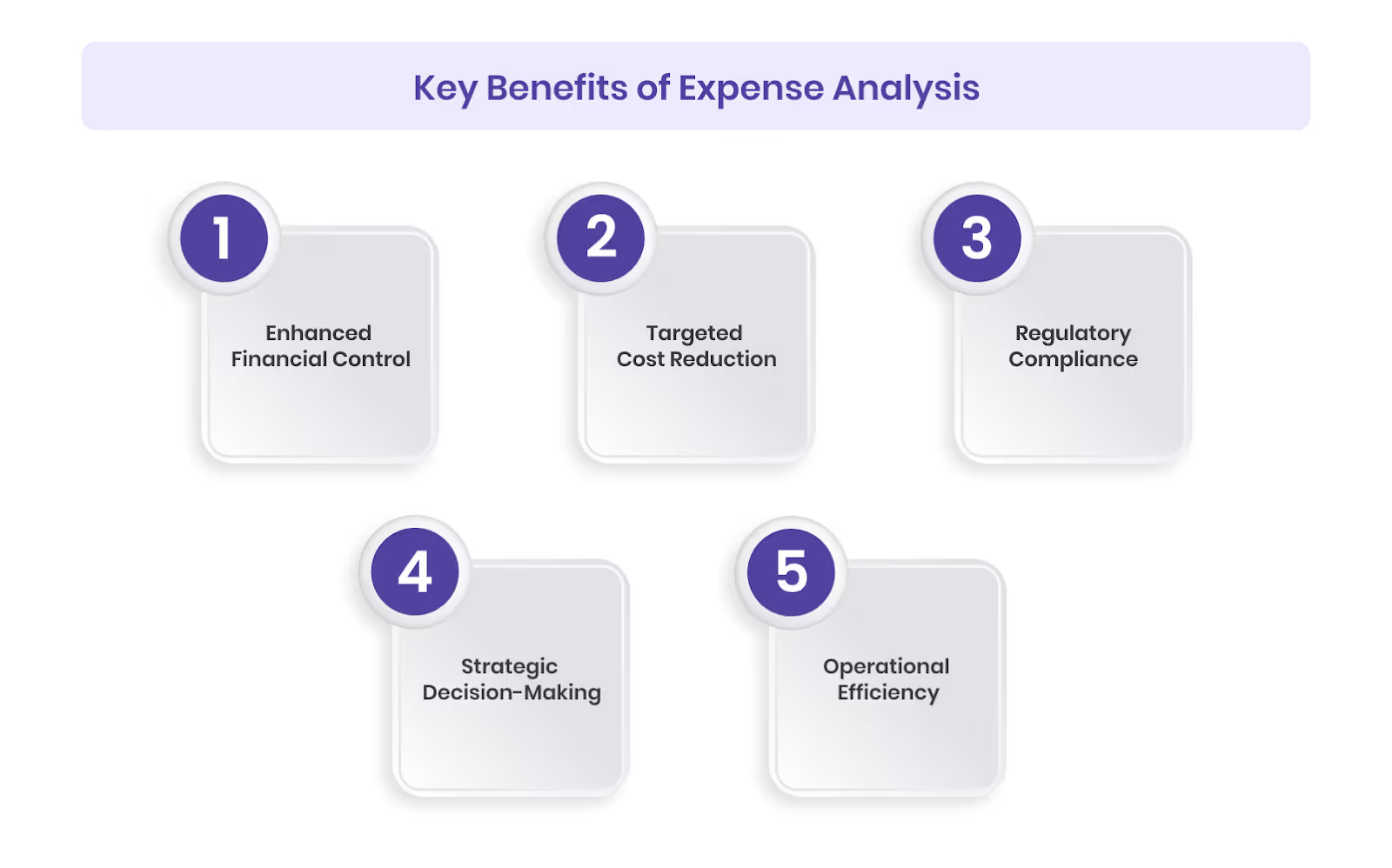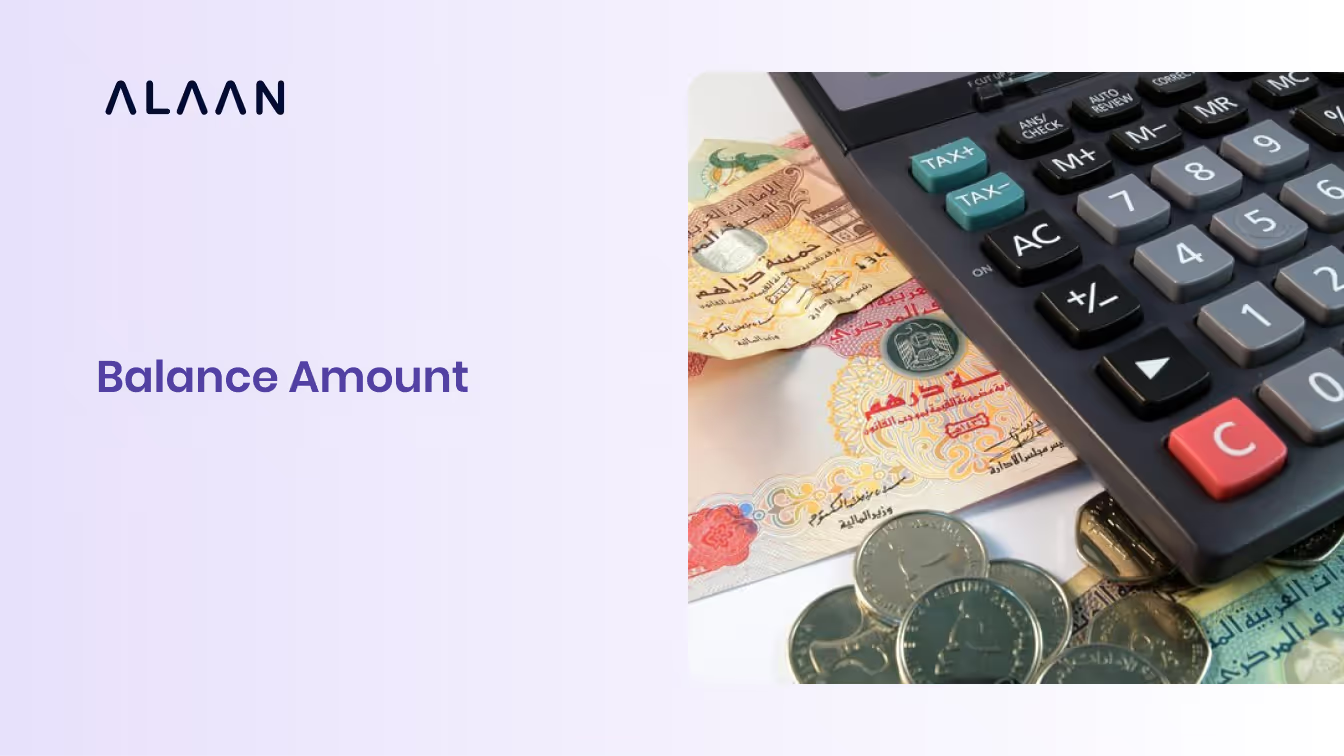Expense management poses a significant challenge for businesses as unchecked expenditures can erode profit margins and complicate compliance with evolving tax regulations.
The solution lies in thorough expense analysis, a systematic approach to examining business spending to identify inefficiencies, ensure VAT and corporate tax compliance, and optimise cost allocation.
In the UAE, where business travel expenses hit $8.6 billion, effective expense analysis is vital to optimise budgets, meet VAT and corporate tax obligations, and protect profitability.
Also, with the UAE corporate tax expanding in 2025 and VAT registration mandatory for businesses exceeding AED 375,000 in taxable turnover, mastering expense analysis is vital.
This blog will discuss data-driven techniques to categorise and assess expenses, uncover savings, and strengthen financial decision-making aligned with UAE regulatory demands.
Key Takeaways
- Mastering expense analysis is essential for UAE businesses to optimise budgets, protect margins, and maintain VAT and corporate tax compliance.
- Categorising expenses by type (fixed, variable, operational, irregular) improves accuracy in tax reporting and reveals high-impact cost drivers.
- Data-driven steps, from comprehensive expense tracking to benchmarking, identify inefficiencies and guide strategic cost-cutting decisions.
- Utilising automation and digital accounting tools ensures real-time visibility, reduces manual errors, and supports audit-readiness under UAE regulations.
- Continuous expense monitoring, clear policies, and employee engagement are non-negotiable for sustainable cost control and long-term profitability.
What is Expense Analysis and Why Does It Matter?
Expense analysis is a precise, systematic examination of a company's spending to uncover patterns, inefficiencies, and opportunities for cost control. In the UAE's complex business environment, where VAT compliance, corporate tax obligations (expanding in 2025), and rising operational costs demand exactitude, expense analysis becomes indispensable.
It allows businesses to categorise expenses accurately, ensure correct tax treatment, and target cost drivers that directly impact profitability and cash flow.
Key features of expense analysis for UAE businesses include:
- Detailed Categorisation: Breaking down expenses into fixed, variable, operational, and irregular types enables targeted cost management and precise VAT compliance.
- Regulatory Alignment: Aligns expense tracking with UAE VAT registration rules (mandatory for businesses with taxable turnover above AED 375,000) and prepares organisations for the 2025 corporate tax regime.
- Cost Efficiency Identification: Highlights specific areas where spending can be optimised without compromising business operations, especially in high-cost segments like business travel and supplier contracts.
- Data-Driven Decision Support: Uses financial ratios, trend analysis, and benchmarking against UAE industry standards to guide strategic budgeting and forecasting.
- Audit and Compliance Readiness: Ensures expense records are transparent, verifiable, and in line with the stringent demands of UAE tax authorities, reducing the risk of penalties.
- Impact on Cash Flow and Profitability: Effective expense analysis enhances cash flow management by pinpointing unnecessary expenditures and improving working capital efficiency.
- Risk Mitigation: Regular expense analysis minimises regulatory risk by ensuring compliance with VAT and corporate tax regulations. It also reduces financial leakage and prevents profit erosion caused by unchecked spending.
What Are The Risks Of Not Conducting Regular Expense Analysis?
Failing to conduct regular expense analysis exposes businesses to several risks:
- Unchecked expenses cause cash flow issues and disrupt operations.
- Inefficiencies erode profit margins and reduce overall profitability.
- Poor tracking increases VAT and tax compliance risks, leading to penalties.
- Inadequate expense data limits strategic decisions and hampers financial planning.
To build on the critical risks of neglecting regular expense analysis, it is equally important to understand the precise advantages that a thorough and systematic expense review delivers to businesses.
Key Benefits of Expense Analysis

Expense analysis provides finance leaders and decision-makers with a clear, data-driven view of where money is spent and how these expenditures impact overall financial health.
For businesses operating in the UAE's evolving regulatory environment, the benefits extend beyond cost control into compliance, strategic insight, and sustainable growth.
The benefits of expense analysis include:
- Enhanced Financial Control and Cash Flow Optimisation: Detailed expense analysis enables tighter cash flow management by identifying unnecessary or excessive spend. This prevents cash shortages, allowing businesses to allocate working capital more effectively, ensuring operational stability even in fluctuating markets.
- Improved Profitability Through Targeted Cost Reduction: By pinpointing high-impact cost drivers and inefficiencies, organisations can strategically cut costs without impairing essential functions. This targeted approach protects profit margins and supports healthier bottom-line performance.
- Regulatory Compliance and Audit Preparedness: Expense analysis aligned with UAE VAT and corporate tax regulations (such as the AED 375,000 VAT registration threshold and the 2025 corporate tax expansion) ensures accurate tax reporting and documentation. This reduces the risk of costly audits, penalties, and reputational damage.
- Data-Driven Strategic Decision-Making: Access to granular expense data, combined with financial ratio analysis and industry benchmarking, aids in forecasting, budgeting, and long-term planning. This empowers CFOs and finance leaders to make informed decisions that align with business goals and market realities.
- Operational Efficiency and Supplier Management: Analysis often uncovers opportunities to renegotiate contracts, optimise supplier terms, and balance fixed versus variable costs. This operational insight enhances resource allocation and vendor relationships.
Now that we know the advantages of expense analysis, understanding the specific types of expenses to track is fundamental for implementing an effective expense management system.
Types of Expenses to Track
In the context of UAE businesses, categorising expenses correctly is more than an accounting formality; it directly impacts VAT treatment, corporate tax calculations, and cash flow management. Precision in tracking different expense types enables accurate reporting, compliance, and targeted cost control.
Below are mentioned types of expenses with their examples:
Building on the process of performing expense analysis on your income statement, businesses must focus on specific, impactful metrics that provide clear insights into profitability and compliance.
What Metrics Should You Focus On When Analyzing Expenses?
Focusing on targeted financial metrics allows finance leaders to quantify the effectiveness of expense management, identify cost-saving opportunities, and assess the broader impact on business performance in the context of the UAE's VAT and corporate tax requirements.
Key metrics for expense analysis include:
To translate key expense analysis metrics into actionable practice, you must know exactly how to interpret the business expenses to account for continuous financial control and regulatory compliance.
How to Analyse Business Expenses Account: Step-By-Step Guide

A structured expense analysis is crucial for businesses operating under stringent UAE VAT and corporate tax requirements. Here is a precise, actionable process:
1. Collect Complete Financial Data
- Obtain all relevant documents: income statement, general ledger, bank statements, invoices, and expense receipts.
- Ensure completeness; missing transactions can compromise accuracy, especially with VAT input claims.
2. Categorise Expenses Meticulously
- Sort each expense entry into the correct category: fixed, variable, operational, or irregular.
- Tag expenses for correct VAT treatment (e.g., standard-rated, exempt, or out-of-scope under UAE law).
- Use accounting software linked to your expense policies for consistency.
3. Verify VAT and Tax Treatment
- Confirm correct VAT rates are applied and review eligibility for VAT recovery.
- For each expense, check alignment with UAE’s deduction rules under the current corporate tax law (effective from June 2023, with expansion in 2025).
4. Conduct Trend and Variance Analysis
- Compare expense data month-on-month and year-on-year to spot spikes, declines, or anomalies.
- Perform budget vs. actual comparisons to highlight overspending or savings potential.
- Use variance reports to trigger an investigation of significant deviations.
5. Calculate Key Financial Ratios
- Determine expense-to-revenue ratio, gross margin, and operating expense ratio using line items from your expense account.
- Benchmark against UAE sector norms to assess efficiency and competitiveness.
6. Identify Cost Drivers and High-Risk Categories
- Focus on expenses that account for the largest share or show abnormal growth, e.g., travel, logistics, and consultancy.
- Review supplier contracts and recurring payments for renegotiation opportunities.
7. Document and Prepare for Audit
- Archive supporting documents and categorisation for each expense (mandatory for UAE VAT audits).
- Ensure systems and processes comply with regulatory standards, reducing audit risk and penalties.
8. Implement Continuous Monitoring
- Schedule quarterly expense reviews.
- Integrate automated alerts for policy breaches or rapid expense growth.
- Train staff on expense categorisation, compliance, and reporting protocols.
Automating expense analysis is the logical next step for businesses that are looking for accuracy, efficiency, and compliance after mastering manual review methods and metrics.
Why You Should Automate Your Expense Analysis
Automation transforms expense analysis from a time-consuming chore into a strategic financial asset, especially for organisations required to comply with evolving VAT and corporate tax regulations. Intelligent automation uses real-time data integration, digital receipts, and accounting platforms to deliver quantifiable advantages.
The reasons to automate your expense analysis include:
- Drastically Reduces Processing Time: Manual data entry and reconciliation are slow and error-prone. Automated systems capture, categorise, and reconcile expenses instantly, freeing finance teams for higher-value strategic tasks.
- Eliminates Human Error and Policy Breaches: Automation applies rules-based expense categorisation and checks, ensuring that every transaction is accurately classified per UAE VAT and tax frameworks. This minimises misfiling and strengthens audit preparedness.
- Real-Time Compliance and VAT Optimisation: Automated platforms track VAT rates, flag anomalies, and update regulatory changes instantly. Businesses receive immediate alerts for missing or non-compliant entries, reducing the risk of penalties or denied tax recoveries.
- Enhances Visibility and Control: Digital dashboards consolidate all expense data, fixed, variable, operational, and irregular, giving CFOs and finance leaders a comprehensive, real-time view of spend. Automated benchmarking tools compare costs against UAE industry norms, highlighting optimisation opportunities.
- Scalable and Future-Proof: As UAE tax and reporting requirements evolve, automation adapts quickly, integrating new rules and thresholds without extensive manual retraining or process overhaul.
Having established the strategic value of automating expense analysis for UAE businesses, it is essential to consider how Alaan’s spend management solution helps control business expenses.
How Alaan Helps in Expense Analysis
Alaan's platform has equipped me with real-time oversight of a company's spend. By issuing corporate cards, you gain immediate visibility into every transaction, categorised by employee, department, and vendor. This automated categorisation adheres to UAE VAT requirements, ensuring no transaction slips through without proper tax treatment.
The benefits of integrating Alaan into your expense management process are:
- Real-Time Spend Visibility: With Alaan corporate cards issued to your team, you see every transaction instantly, categorised by employee, department, and vendor. Each one is automatically aligned with the correct UAE VAT category (standard-rated, exempt, out-of-scope) to ensure compliance from the outset.
- Automated Expense Reconciliation: Every card payment or bank transfer is automatically matched to digital invoices or receipts, removing manual work, speeding VAT documentation, and flagging any anomalies for your immediate attention.
- Custom Expense Categorisation for VAT & Tax: You can map expenses to categories that align precisely with Federal Tax Authority (FTA) requirements, making VAT reclaim during audits faster and more accurate.
- Real-Time Alerts & Policy Enforcement: Alaan's analytics dashboard notifies you instantly if a transaction exceeds its set limit, breaches policy, or is missing receipts, so you can step in before minor issues become costly.
With Alaan, you move from reactive expense tracking to proactive financial control and make faster and more informed business decisions.
Book a free Alaan demo now and see how effortless UAE VAT compliance and cost optimisation can be.
Conclusion
In the UAE’s evolving regulatory and tax environment, expense analysis is no longer a periodic bookkeeping exercise; it is a strategic imperative.
Accurately categorising, monitoring, and optimising expenses safeguards cash flow, protects profit margins, and ensures airtight compliance with VAT and the 2025 corporate tax regime.
The businesses that excel will be those that move beyond manual, reactive tracking and embrace real-time, automated expense visibility to make faster, data-backed decisions.
Stop letting inefficient processes and compliance risks drain your business resources.
With Alaan, you gain instant transaction visibility, automated VAT-compliant categorisation, and audit-ready records, all in one secure platform built for UAE finance leaders.
Take control of your expenses today.
Schedule a demo with Alaan and see how you can cut costs, stay compliant, and make smarter financial decisions
Frequently Asked Questions (FAQs)
1. What role does expense analysis play in budgeting for UAE businesses?
Expense analysis provides detailed insight into past spending patterns, enabling more accurate budget forecasts and realistic financial planning aligned with UAE tax obligations.
2. Can expense analysis help detect fraud or misuse of company funds?
Yes, regular and detailed expense reviews highlight unusual or unauthorized transactions, supporting fraud detection and enforcing corporate spending policies.
3. How often should UAE businesses conduct expense analysis?
Ideally, expense analysis should be done monthly or quarterly to keep financial data accurate and ensure timely VAT compliance and cash flow management.
4. What is the impact of inaccurate expense categorisation on UAE VAT claims?
Incorrect categorisation can lead to denied VAT refunds or fines during FTA audits since input VAT recovery depends strictly on compliance with classification rules.
5. Are there industry-specific considerations in expense analysis for UAE businesses?
Yes, sectors like trading, hospitality, and manufacturing have unique expense patterns and VAT treatments, requiring tailored analysis approaches.
6. How does expense analysis support UAE companies in preparing for the 2025 corporate tax expansion?
It establishes a clean, detailed financial record with clear expense categories, facilitating accurate tax reporting and minimising audit risks under the new regime.


.avif)







%201.avif)